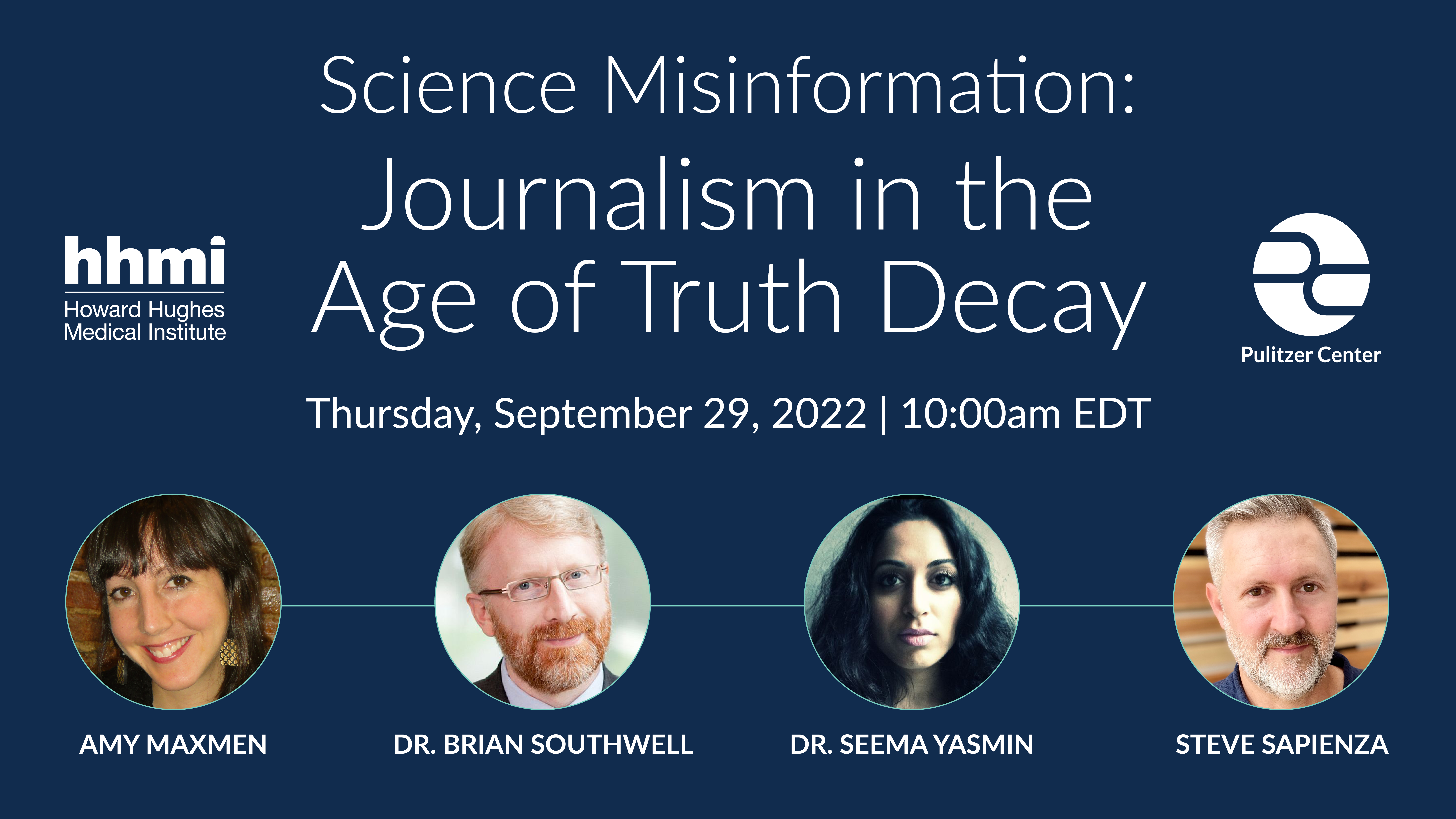Event
Science Misinformation: Journalism in the Age of Truth Decay
Event Date:
September 29, 2022 | 10:00 AM TO 11:30 AM
Join the Pulitzer Center for the launch of a new reporting initiative and a virtual conversation about journalistic approaches to addressing the scourge of scientific misinformation and disinformation. This 90-minute discussion will begin on Thursday, September 29, 2022, at 10:00am EDT.
The Pulitzer Center and the Howard Hughes Medical Institute (HHMI) Department of Science Education cordially invite you to a virtual conversation about the many challenges of scientific misinformation and the role journalists might play in exposing and countering pseudoscience and science denial. Participants will hear perspectives on pseudoscience and misinformation in mass media and society from author and award-winning journalist, Dr. Seema Yasmin, and Dr. Brian Southwell, a leading scholar and expert on misinformation and mass audiences, including science and misinformation as a challenge to public health.
Participants will also learn about a new Pulitzer Center grant opportunity, supported by HHMI, for innovative journalism projects that tackle science denial and misinformation.
This virtual event will be co-moderated by award-winning science reporter, Amy Maxmen, and the Pulitzer Center's Senior Strategist, Steve Sapienza.
Please join us for this special online launch event. Register here.
Speaker Bios
Dr. Seema Yasmin is an Emmy Award–winning journalist who was a finalist for the Pulitzer Prize, medical doctor, professor, and poet. Dr. Yasmin is the author of five books of non-fiction and poetry including her latest book, What the Fact?, about the importance of media literacy, fact-based reporting, and the ability to discern truth from lies.
She attended medical school at Cambridge University and worked as a disease detective for the U.S. federal government’s Epidemic Intelligence Service. She currently teaches storytelling at Stanford University School of Medicine, and is a regular contributor to CNN, Self, and Scientific American, among others. Her unique combination of expertise as a dually trained physician and storyteller has been called upon by the Vatican, the Presidential Commission for the Study of Bioethical Issues, the Aspen Ideas Festival, the Skoll World Forum, and others.
Dr. Brian Southwell is senior director of the Science in the Public Sphere Program in RTI International’s Center for Communication Science. He also is adjunct professor of internal medicine with Duke University and a graduate faculty member and adjunct associate professor in Health Behavior at the University of North Carolina at Chapel Hill. Dr. Southwell has published widely on topics such as public understanding of science and misinformation as a challenge to public health.
He co-founded the Duke Program on Medical Misinformation to improve patient-provider conversations about misinformation, and he also has published a book, Misinformation and Mass Audiences, and numerous articles on the topic. His work on misinformation has been featured in outlets such as JAMA and The Hospitalist. In addition, Dr. Southwell created and hosts The Measure of Everyday Life, a public radio show that translates research for general audiences on WNCU 90.7 FM, based at North Carolina Central University.
Sponsoring Organizations
The Pulitzer Center on Crisis Reporting is a non-profit journalism organization that raises awareness of underreported global issues through direct support for quality journalism across all media platforms and a unique program of education and public outreach. Visit www.pulitzercenter.org for more information.
The Howard Hughes Medical Institute (HHMI) Department of Science Education is the leading private nonprofit supporter of scientific research and science education in the United States. The Department of Science Education advances the public’s understanding of science through its HHMI Tangled Bank Studios unit, which creates award-winning stories of scientific discovery for television and big screens, and through its support of science journalism. Visit www.hhmi.org for more information.




